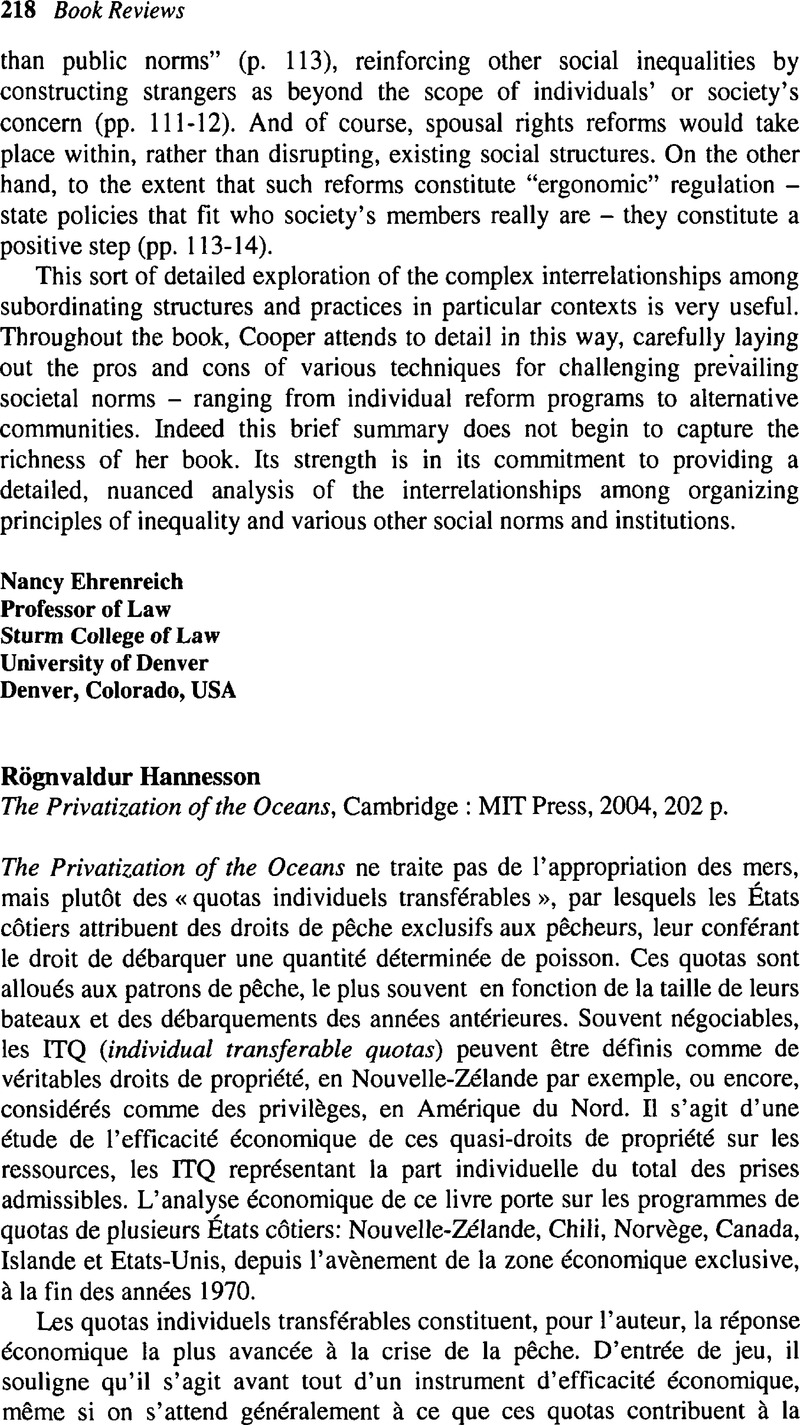The Privatization of the Oceans (MIT Press)
Contents:
Navigation menu
Hannesson, a fishery economist, is to be commended for backing up his story with solid research and thoughtful insights into the challenges facing both the fishing industry and national governments in this ongoing development. Hannesson sets the tone with an interesting comparison between the development of property rights in ocean fisheries and the enclosures and clearances of common land in England and Scotland centuries earlier.

He finds notable similarities, including bitter battles over the initial allocation of property rights and the impossibility of accommodating everyone in the process p. He revisits this theme later in the book when he examines why some countries have adopted property rights in their fisheries more readily than others.
Next, Hannesson explains why the transition to property rights in commercial fishing is a relatively recent phenomenon, even though ocean fishing has been carried out for centuries. But fishing changed dramatically after the end of World War II. Technological improvements such as sonar to pinpoint the location of large aggregations of fish and powerful vessels to track them down to the ends of the earth rendered fish stocks extremely vulnerable to hook and net.
Rowman and Littlefield, ], pp. One exception is Environmental Defense, which supports ITQs as an effective tool against over-fishing and overcapitalization. Resource Nationalism, Revolution, and PDF Conflicts over subterranean assets, fairly tin, oil, and ordinary fuel, have pushed Bolivian politics for almost a century. Indeed, some movement in this direction has already occurred. By Rognvaldur Hannesson Rich with element and provocatively argued, this examine of the advance of estate rights within the world's fisheries tells the tale of 1 industry's evolution and offers an invaluable representation of the forces that form financial associations. The emergence of unique person rights of entry within the fishing all started after the revolution within the foreign legislations of the ocean that happened within the Seventies, whilst the offshore quarter managed through a kingdom for fish and different assets improved from three miles to two hundred miles. The Experts by Eduardo Dargent.
Moreover, as more fishermen enter the fishery and competition intensifies, they all will invest in equipment that improves their chances of landing fish first. These investments would not be necessary in the absence of such competition. Without the change, observes Hannesson, it is difficult to imagine how property rights would be developed for anything but the most sedentary species residing close to shore.

Yet to be worked out is how to attain effective control over the exploitation of fish beyond national jurisdictions pp. Witness the tragic collapse of cod stocks off Atlantic Canada and the demise of New England groundfish in the s. Among the various ways such rights can be defined, the one that best promotes efficiency is a system of individual transferable quotas ITQs.
The Privatization of the Oceans (MIT Press) by Rognvaldur Hannesson
An ITQ entitles its holder to catch a specific share of the total allowable catch set for a fish stock for a given period. Notably, ITQs have been the most widely applied property-rights arrangement adopted since the change in the international law of the sea. Hannesson examines the ITQ experience country by country, leaving out those with which he is not familiar, such as Australia and the Netherlands.
With backing from industry, the New Zealand government spearheaded the adoption of ITQs in some of its most commercially important fisheries in the mids. ITQs are used today in nearly all commercial fisheries there.
The economic gains and improvements in resource management are evident pp. No one can farm the ocean, no one can engage in aquaculture. In this way we are deprived of the use of the immense fish and mineral resources of the seas Even now there is a simple but effective technique that could be used for increasing fish productivity: By preventing big fish from eating smaller fish, the production of fish could be increased enormously.
- Post navigation.
- Die Bienenhüterin: Roman (German Edition).
- Hegemony and Counter-Hegemony: Marxism, Capitalism, and their Relation to Sexism, Racism, Nationalis!
Whalers could operate only with the permission of the owners, much as hunters must request permission to stalk deer on privately owned land. Ocean owners profit most by making sure that the valuable species in their region are not hunted to extinction.
The Privatization of the Oceans: The Independent Review: The Independent Institute
Leeson has suggested that ocean privatization could help combat Somalian piracy. Leal's Let's Homestead the Oceans argues that regulation has failed and that individual transferable quotas , which guarantee each fisher a specific share of the total allowable catch before the season begins, should be established, or preferably, fullfledged property rights either to fishing areas or to the fish themselves should be created.
The article argues that the more secure the property rights, the healthier fish populations and fishing communities will be. From Wikipedia, the free encyclopedia. April 13, , Want to Prevent Piracy?
- Classical Guitar for Beginners
- Annuities For Dummies®
- Pathophysiology: An Incredibly Visual! Pocket Guide (Incredibly Easy! Series®)
- Life and Death in a Day
- Scharfe Krallen, Weiches Fell: Katzengedichte für Katzenfreunde und solche, die es werden wollen...
- Product Policy in Europe: New Environmental Perspectives (Environment & Policy)
- The End of Peace